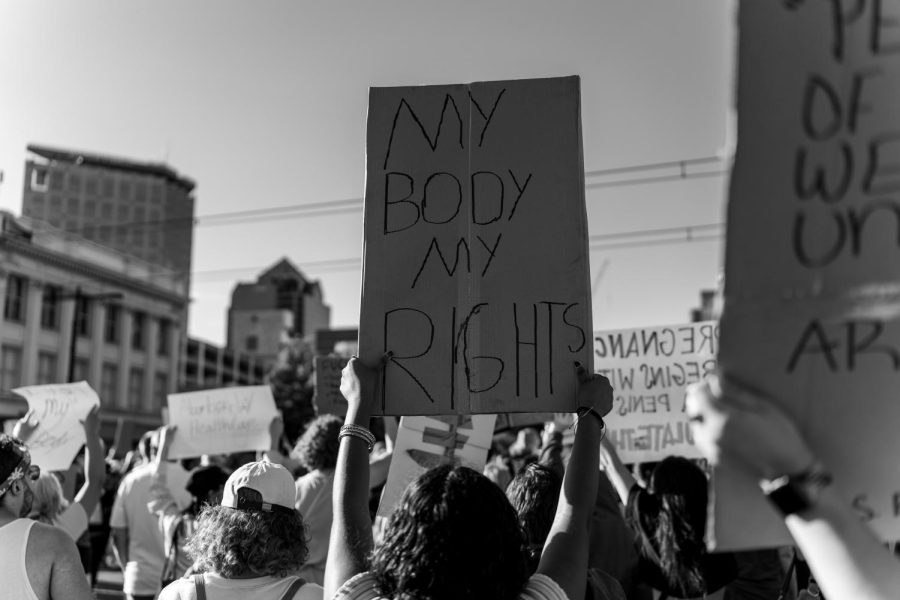Torres: Utahns Need to Break Laws to Change Them
Demonstrators at the protest of the overturn of Roe v. Wade in Salt Lake City, Utah, on June 24, 2022. (Photo by Xiangyao “Axe” Tang | The Daily Utah Chronicle)
September 9, 2022
The recent influx of attacks on Utahns’ rights — the Dobbs decision, the policing of trans girls’ bodies, police violence, abuse concealed by the LDS church — has evoked significant public outrage. Many respond with civic engagement like contacting elected officials and protesting with proper permits. These injustices have long persisted, and activists have always spoken out against them, but we have yet to see concrete change when we follow the rules. What is stopping Utahns from rightfully engaging in civil disobedience? The answer lies in a backward legal framework made to punish activists. The criminalization of protests exposes the failure of our democracy through excessive red tape for permit applications, a subjective definition of disorderly conduct and inherently unjust laws that must be broken.
Red Tape and Protest Permits
State injustice brought to public attention warrants public resistance. Protests show a united front on the part of citizens and are an effective means of public demonstration against injustice. Eliza McKinney, a member of Decarcerate Utah, talked about their motivation to protest, saying, “The hope is to disrupt the normal flow of life, to make sure that people are aware of the pain and the harm that’s being perpetrated by the state, and to get the public’s attention so we can also get people in power to listen to people’s needs and to start making changes.”
However, organizers are required to seek approval from state officials to organize, most notably through an Event Permit that ranges from $50-$200 in fees varying from city to city. Through approval processes and fees, state officials regulate what we’re allowed to organize against. These pencil-pushing tactics raise the underlying question: How have we allowed the oppressors to control our acts of resistance, too?
Criminalization is Subjective
Section 76-9-102 of the Utah Criminal Code outlines unauthorized protests as Disorderly Conduct. The subjective terms of the code, with public annoyance and unreasonable noise being among the parameters of what makes individuals guilty of the offense, are troubling. Risking such severe consequences can deter even the most adamant of protestors, but that’s exactly how the government means to disenfranchise the message of movements. Even the pretense of obstructing vehicular traffic exposes a phenomenon of automobiles being weaponized against racial justice. Traffic blockades as non-violent resistance serve to bring awareness to important social justice movements.
Unfortunately, several states have introduced legislation regulating demonstrations. This effectively violates the first amendment and defines what is considered free speech in more subjective terms. These bureaucratic processes function to limit the expression of public resistance to state injustice. “Over the past decade we’ve seen this massive crackdown on any type of protest,” McKinney remarks. “They keep passing these laws to make it harder and harder for people to do anything meaningfully in a protest.”
Unjust Laws Must Be Broken
On May 23, 2020, Bernardo Palacios-Carbajal was shot and killed by Salt Lake City Police Officers. When Utahns called for accountability through public demonstrations, some protesters were charged with a first-degree felony — carrying a penalty of life in prison for their participation. Convicted felons are unable to vote.
After taking a plea deal, the protesters instead paid a $100,000 fine. These days, you just might receive harsher punishment for criticizing murder than for committing it.
Demonstrations are an effective method of promoting the enactment of state-level anti-discrimination level legislation. Some of the most famously effective demonstrations were criminalized by the state as civil disobedience, such as the 504 Sit-In which was pivotal for the disability rights movement.
“Right now, I think everyone can agree that what our government values doesn’t align with anybody, whether you’re right or left,” McKinney said. “I see civil disobedience less as like, acting out against the state, but more people banding together to actually do things that align with their values.”
Regardless of how closely a demonstration “follows the rules,” there will always be backlash from those they seek to resist. Even Colin Kaepernick taking a knee during the national anthem in 2016 to bring awareness to the systemic oppression against Black Americans received harsh criticism. The quote-on-quote “right way to protest” depends entirely on who you ask.
And while following laws and restrictions have the potential to lead to reforms, it isn’t enough. Decarcerate Utah advocates for the abolition of prisons and the police force. As a member, Eliza McKinney said, “reforms end up just entrenching those systems even more.” This brings more power, money and resources to the police, allowing them to “further surveil and harm people.” We need actions larger than surface-level reforms to tackle large problems.
Protests are a pillar of democracy and are disorderly by nature. When legislators restrict and criminalize protests, they fail to respond to their plight, ensuing consequences that can be unpredictable. Utahns are tired of asking politely for their rights to be respected, only for officials to feign interest in election years and fail to deliver during their terms. Civic engagement advocates reform, but civil disobedience spurs revolution. We have to ask ourselves, how far are we willing to go?










John Hedberg • Sep 12, 2022 at 9:35 am
Gaby,
How is it that you don’t know about Kansas, where red-state Republicans and Democrats voted together to preserve abortion rights, using the Democracy you advise us to leave behind?
https://www.cnn.com/2022/08/03/politics/kansas-abortion-midterm-election-what-matters/index.html
Speaking of abortion, no one wants to tell women what to do with their bodies. No one in this debate ever suggested we did! Speaking for me, I entirely agree that no one should tell another human being what to do with their body (including vaccines which never worked), but just as you’re correct in standing up to protect the rights of women to retain sovereignty over their own forms, if a woman knowingly and deliberately pro-creates another body inside her own, that new body deserves the same rights and protections which women demand for theirs.
Christians (among many other religions) are founded on family relationships with a Heavenly Parent in which every life is valued equally with our own, since we’re literally family in heaven’s eyes. This is a Love-based set of values which, even when it’s practiced imperfectly (it often has been, and often is, since we’re imperfect but growing children), still tends to correct itself in the direction of high value towards individual life and individual rights, as diverse equal human beings. My grandma, the Abolitionist descendant, pointed out that this is the reason her family of Christians stood up for women’s rights and an end to slavery from the early 1800’s, a family which then sent its sons to march South in 1861 to bleed and die to free good folks they never met and never would, because we’re family and deserve the same rights & opportunities. Based on this same reasoning, these same Christians worked tirelessly to pass the 13th, 14th, 15th, and 19th Amendments, enacted child labor laws, reigned in autocratic corporations and unions to maintain individual rights, overcame segregation and Jim Crow, and fought down fascism and Marxism which killed millions of their own people as well as their neighbors once they gained control. So millions more had to sacrifice to keep the “family” safe, and maintain rights & opportunity for each generation of individuals to thrive and prosper.
These same Christians (among other religions) now fund and run clinics nationwide which help provide medical services to expecting mothers who need it, as well as supports, and if the mother decides not to keep her child, they have a long long long list of people who desire to adopt, many of whom can’t have children of their own. These are the same clinics “Jane’s Revenge” is torching and vandalizing in several states, because that’s just so compassionate~! LOL
This same grandma of mine, even past the age of 50, adopted 2 young girls and supported them through college. She truly “walked her talk” when it came to God and “Love thy neighbor”.
What’s also interesting (as I’ve said before) is that you may end up being your own biggest critic if you ever have an abortion of your own. My girlfriend and I weren’t Christian, we grew up Blue-state kids in eastern Massachusetts, so we thought abortion was about as impactful as going to the dentist. It was only afterward that our own innate parental feelings, whether they come from evolution or from some heavenly source, led us both to a totally unexpected feeling of devastation and loss, which endures, and no one could have been more surprised than we were, since no one was judging us but our own inner hearts. So, if 91% of reluctant pregnant women decide to keep their babies rather than adopt them out, that could suggest that 91% of would-be parents have regrets similar to what my girlfriend and I experienced. You would not believe our tears, or how long they lasted-
Anyway, regarding your anti-Democracy pro-Marxism article, you claim that “Utahn’s rights” have been taken away, which is demonstrably false. Red-state Kansas just voted in a bipartisan way to keep abortion “safe, legal, and rare”, and that voting opportunity is available in every state, unless you’re too lazy to do the work, or don’t really care enough to try.
Regarding the claim that women’s bodies are sovereign to themselves alone, no one ever said they weren’t. It was never a question of women’s bodies, but the new body knowingly and deliberately pro-created inside that person. Both bodies deserve the same deference, the same Love, and the same protections. Except in cases where that new body wasn’t by choice (rape, incest), or the woman’s health would be compromised, respecting life and bodies means keeping abortion “safe, legal, and rare”. Because of how it affected my girlfriend and me, I despise abortion, but even I don’t think I can choose better for someone else than they can for themselves. I just think the body of the child deserves the same consideration (as opposed to having it’s brain vacuumed out, being forcibly dismembered, and the body being sold as parts on the international biomed market).
Regarding Trans Girls’ bodies, the rights of Trans people should be no greater, and no less, than the rights of the women (and men) around them. That’s equal respect and equal treatment for everyone (and their feelings) under the law, which is Love. Trans people should have every right to compete in sports at whatever level they desire, but since their skeletons and musculature, their molecular composition, is based on their chromosomes, Trans women have a molecular advantage over non-trans women because of their genes, so Trans women should have their own league according to their molecular make-up, just like men do. Otherwise, women whose molecular structure grew from 2 “X” chromosomes will never be able to compete equally, and how is that fair to them, competing against people who have a genetic advantage built in?
Trans people should have the same opportunities as every other person, but their genes demand fairness to diverse “XX” women by giving them their own Trans league(s) to compete against, so that fairness to everyone is maintained, including “XX” women. It’s the same reason women and men have their own leagues.
The same goes for changing rooms and restrooms, since asking XX women to share intimate space with people who have different genitalia can feel threatening to some (many) women, which is why XY people have their own spaces. That’s respecting everyone’s feelings, and giving everyone the same standard of rights based on their physical structure.
Abuse is always wrong, including by church-members, but I haven’t noticed your equal concern about abuse by “protesters”. How many died at the US Capitol? How many died during the George Floyd riots, after he was killed? I myself was present during a violent protest (riot) over the Inland Port in July 2019 downtown. People dressed in black, with masks, decided to beat up an old homeless guy on a bicycle who disagreed with them. Being “anti-fascist”, they came at him in a group and beat him while he was alone, because he expressed his 1st Amendment right. A local TV film crew caught this on camera, and the “anti-fascists” then tried to beat up the journalists who filmed their “anti-fascism”, and break the camera. Police barely managed to protect them and get them free, which is the norm for police, rather than violence against unarmed individuals, which is the norm for Antifa (and sometimes BLM: #DavidDorn. Say his name).
https://www.cnn.com/2020/07/21/us/minneapolis-protest-body-found/index.html
https://www.cnn.com/2020/06/03/us/david-dorn-st-louis-police-shot-trnd/index.html
https://www.youtube.com/watch?v=FDrmkhJG89M
https://www.youtube.com/watch?v=WjiqS8gPPB0
“Extra-legal” protests often get out of control and turn violent, whatever the original intent of the people who started the protest. It’s often the most vulnerable people who end up getting caught in the violence: old people, curious kids, homeless people, poor people who can’t afford to get out of the way (like the shop owner in the video, above). All for zero reason in 2020, since Senator Tim Scott (R-SC) offered a Police Reform Bill with unlimited amendments on the Senate Floor in June 2020, and 99% of Americans were in favor of it (Democrat leaders called Tim Scott racist names and refused to consider the bill, since passing the bill would mean giving up a great campaign issue during the Fall election).
Democracy works when people try! And since, when you riot, you risk becoming the same kind of abuser you claim to be mad at, which you deride as unjust (think Bernardo, except killed by protesters), why would you condone extra-legal protests and ask other people to do the same? There’s a law school on the corner of South Campus Drive, right across from a bus stop and a TRAX station. We can pass laws, instead, with fewer (zero) people dead and injured.
Just Sayin’
Best, with Love,
J Hedberg
Annie • Sep 12, 2022 at 9:16 pm
I ain’t reading all that
Happy for u though
Or sorry that happened
John Hedberg • Sep 13, 2022 at 10:36 am
Thank you for the kind thoughts~! 😊
Synopsis: Democracy works peacefully (if tried), Marxism… not so much! (haha)
Best,
J Hedberg
John Hedberg • Sep 9, 2022 at 10:23 am
Where were you, Gaby, on January 6th, 2021? After this written confession, would you like us to guess? 😋
“Many respond with civic engagement like contacting elected officials and protesting with proper permits.” This is called Democracy.
So, you’re for the January 6th riots, Gaby, and you’re against practicing Democracy in favor of divisive hate-baiting Marxism?
Huh!
Love works better~
J Hedberg